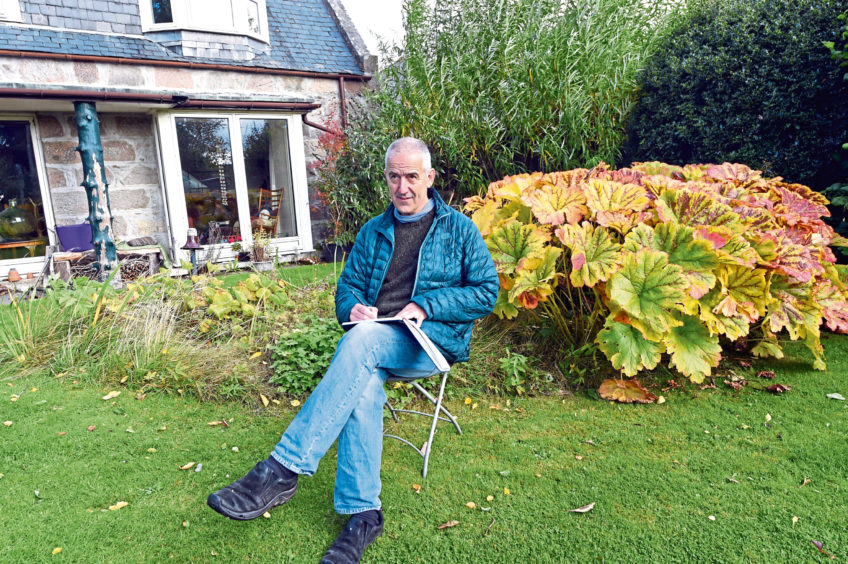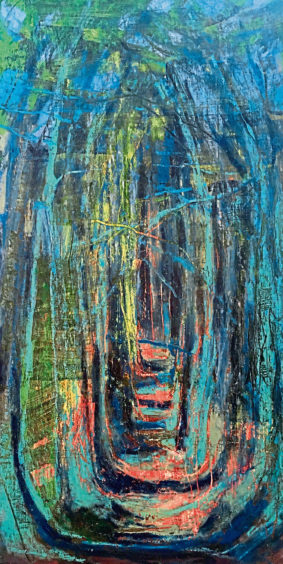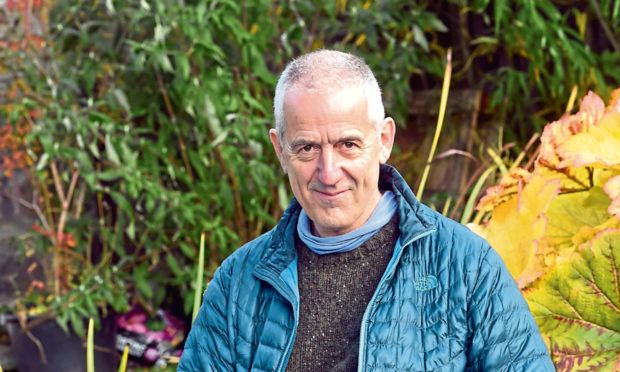When Stephen Redpath picks up a paintbrush, his mind is instantly still.
He doesn’t think about the illness which forced him to quit his former career, only of the landscape which is gradually appearing on the canvas.
At one with his studio, which he jokes is suitable for a hobbit, Stephen can paint for hours.
He is forever inspired by the world around him, and can often be seen strolling around Tarland with a sketchbook in hand.
While few people can remain untouched by the beauty of Aberdeenshire, it is Stephen’s wondrous way of seeing the world which means he has already held his first solo exhibition.
His work was recently on display at Tolquhorn Gallery, near Ellon, one of the leading independent galleries in Scotland.
To be featured within a year of taking up painting full-time is a remarkable achievement, and Stephen admits he is amazed by his success.
It hasn’t all been plain sailing, however, after a diagnosis saw Stephen leave behind an impressive career spanning 35 years.
“I was a professor at Aberdeen University, where I lectured in ecology and conservation,” says Stephen.

“I had a research team and a lot of my work was looking at how we can deal with declines in wildlife populations.
“I’ve always been fascinated by the natural world, ever since I was a child really.
“I grew up in Pembrokeshire, which has certainly influenced me.”
Stephen was diagnosed with chronic fatigue syndrome, also known as ME, last year – and believes painting has been his salvation.
“It’s a horrendous condition because it sucks the energy out of you,” he says.
“It affects your cognitive function, and it left me feeling exhausted.
“I get brain fogs. It’s like the day after you’ve had the flu and you’re trying to recover.
“I just couldn’t do my job and eventually I had to stop.”
Although Stephen had always enjoyed painting, he normally only got the chance when on holiday.
He had planned to eventually retire and focus on art, so his rather impressive new pastime is perhaps no surprise.
“It came around far quicker than I thought,” says Stephen.
“Painting was the one thing I could actually do following the diagnosis.
“My brain doesn’t work very well, but I can sit and paint all day long.
“I can easily paint for eight or nine hours, and in a way it has stopped me from going mad.”
But what is it like to be a scientist turned artist in lockdown?
“I think I already felt like I was in my own kind of internal lockdown before Covid happened,” says Stephen.
“Of course, having ME has affected the relationship which I have with the world.

“It seems further away, as if I am trapped behind glass. So when the restrictions arrived, my life didn’t change very much.
“I still have this enormous passion for nature and the natural world, but as an artist instead of a scientist, I express it differently.
“Now I find myself focusing on the beauty and the emotional impact.
“I’ve never been the type of person who can just sit around – I didn’t envisage spending my retirement playing golf.
“I try and express myself through painting. It is a bonus that people want to look at my work and even buy it.
“It feels like it’s bursting out of me, this need to get paint on paper.”
ME has impacted my entire life, but not on my ability to paint. That in itself is an absolute, glorious joy.”
Stephen Redpath
Stephen has stored images in his head from his time spent in far-flung locations around the world, including the Serengeti.
He believes Scotland still retains the greatest hold on his heart, however, and the relationship which he has developed with walking routes on his doorstep can clearly be seen in his work.
“Of course I am influenced by the Scottish weather, and I can’t actually imagine living in a better part of the world,” he says.
“Painting is like a drug to me. I am constantly searching for the connection between me, the landscape and the painting. When those three things start talking to each other, it’s magic.
“I am not so interested in representational paintings, it’s more about how a landscape makes me feel.
“It gives me this huge buzz, a rush of endorphins.”
Stephen is now preparing for a five-month residential art course at Bridge House Art in Ullapool.
He works with ink, charcoal and pastels, although watercolour remains his first love.
“I never lost my passion for art during all my years of working in science,” says Stephen.
“Painting is now a compulsion, it is something I have to do.
“ME has impacted my entire life, but not on my ability to paint.
“That in itself is an absolute, glorious joy.”
